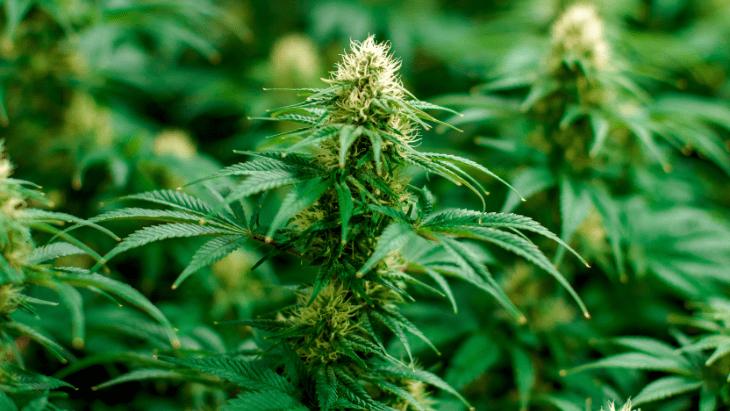
For the first time, the Drug Enforcement Administration has called for ‘botanical cannabis’ to be reclassified under federal law.
The DEA’s decision, which the Associated Press first reported early Tuesday afternoon, to move cannabis from Schedule I to Schedule III of the US Controlled Substances Act comes eight months after the US Department of Health and Human Services initially advocated for the change, finding, “The vast majority of individuals who use marijuana are doing so in a manner that does not lead to dangerous outcomes to themselves or others.” The Biden Administration initiated federal agencies to review the issue in October 2022 – marking the the first time a President has ever made such a request.
“Today, the Attorney General circulated a proposal to reclassify marijuana from Schedule I to Schedule III,” Justice Department Director of Public Affairs Xochitl Hinojosa said in a statement, the AP reported. “Once published by the Federal Register, it will initiate a formal rule-making process as prescribed by Congress in the Controlled Substances Act.”
By definition, Schedule I substances are criminally prohibited by federal law because they possess a “high potential for abuse“ and have “no currently accepted medical use in the United States.” Cannabis has remained classified as a Schedule I controlled substance since 1970.
Commenting on the forthcoming opinion, NORML Deputy Director Paul Armentano said, “It is significant for these federal agencies, and the DEA and FDA in particular, to acknowledge publicly for the first time what many patients and advocates have known for decades: that cannabis is a safe and effective therapeutic agent for tens of millions of Americans.”
Armentano cautioned, however, that reclassifying cannabis as a Schedule III substance would not immediately address the growing chasm between federal law and the laws of most states that currently regulate cannabis for either medical or adult use.
“The goal of any federal cannabis policy reform ought to be to address the existing, untenable divide between federal marijuana policy and the cannabis laws of the majority of US states,” he said. “Rescheduling the cannabis plant to Schedule III fails to adequately address this conflict, as existing state legalization laws — both adult use and medical — will continue to be in conflict with federal regulations, thereby perpetuating the existing divide between state and federal marijuana policies.”
Historically, Schedule III substances have received explicit market approval by the FDA; they are only legal to possess when obtained in licensed pharmacies under a physician’s prescription.
“Just as it is intellectually dishonest and impractical to categorize cannabis in the same placement as heroin, it is equally disingenuous and unfeasible to treat cannabis in the same manner as anabolic steroids and ketamine,” Armentano said. “The majority of Americans believe that cannabis ought to be legal and that its health risks are less significant than those associated with federally descheduled substances like alcohol and tobacco. In fact, HHS reached a similar conclusion regarding cannabis’ safety profile in its own analysis.
“Like those latter substances, NORML has long argued that the cannabis plant should be removed from the Controlled Substances Act altogether, thereby providing state governments — rather than the federal government — the ability to regulate marijuana in the manner they see fit without violating federal law, and allowing the federal government to provide standards and guidelines for regulated cannabis markets.”
This is the fifth time that a cannabis rescheduling petition has been decided by the DEA. The agency rejected a similar petition in 2016.
The DEA’s rescheduling decision, once formalized, does not take immediate effect. The agency must first accept public comments, during which time interested parties can formally request administrative hearings to further debate the issue. Only following public comments and a possible judicial review will the agency issue its final determination. Changes in marijuana’s federal status will then take effect 30 days following publication of the DEA’s final rule in the Federal Register.
The DEA’s decision notwithstanding, Armentano speculated that federal agencies may ultimately request Congress to create new regulatory pathways for cannabis products, particularly for those marketed for adult use. The FDA made a similar request in 2023 with respect to hemp-derived CBD products, which they determined did not fit within any existing regulatory frameworks.
Additional information on cannabis rescheduling is available from the following NORML op-ed and Fact Sheet.
Related
Medical Disclaimer:
The information provided in these blog posts is intended for general informational and educational purposes only. It is not a substitute for professional medical advice, diagnosis, or treatment. Always seek the advice of your physician or other qualified healthcare provider with any questions you may have regarding a medical condition. The use of any information provided in these blog posts is solely at your own risk. The authors and the website do not recommend or endorse any specific products, treatments, or procedures mentioned. Reliance on any information in these blog posts is solely at your own discretion.






